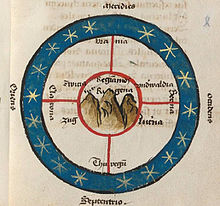This article includes a list of general
references, but it lacks sufficient corresponding
inline citations. (June 2021) |

Albrecht von Bonstetten (c. 1443-c. 1504) was a Swiss humanist of the later 15th century. A member of the baronial von Bonstetten family, he entered Einsiedeln Abbey at a young age, and after studies in Fribourg and Basel he returned to Einsiedeln and was made deacon in 1469. He studied canon law at Pavia and was ordained a priest in 1474, and he received the title of doctor utriusque iuris from Emperor Maximilian in 1498. He published a biography on Nicholas of Flüe called Historia fratris Nicholai in 1479. [1]
He is the author of a number of religious and historiographical works in Latin. His Superioris Germaniae Confoederationis descriptio (written in 1479) is the oldest geographic description of the Old Swiss Confederacy (called by von Bonstetten the "Upper German Confederacy"; the adoption of the name of Schwyz developed after his time). The work was presented to the king of France and the Doge of Venice in 1479, and was combined with a description of Burgundy in a new edition for pope Sixtus IV in 1480. Also in 1480, the work appeared in German translation, as Obertütscheit Eidgnosschaft stett und lender gelägenheit. It was edited by Gall Morel in 1847. [2]
References
- ^ Signori, Gabriela (2006). "Nikolaus of Flüe († 1487): Physiognomies of a late medieval ascetic". Church History and Religious Culture. 86 (1/4): 236. ISSN 1871-241X.
- ^ G. Morel, "Alberti de Bonstetten Descriptio Helvetiae = (Schilderung der Eidgenossenschaft von Albert von Bonstetten)", Mitteilungen der antiquarischen Gesellschaft in Zürich 3 (1845–1847), 94–105.
- Regula Schmid (2010). "Albrech of Bonstetten". In Dunphy, Graeme (ed.). Encyclopedia of the Medieval Chronicle. Leiden: Brill. p. 27. ISBN 90-04-18464-3.
- A. Erdös, 'Anfänge der Schweizer Landeskunde. Aus der Beschreibung der Eidgenossenschaft durch Albrecht von Bonstetten (1479)', in: Turicensia Latina. Lateinische Texte zur Geschichte Zürichs aus Altertum, Mittelalter und Neuzeit, cur. P. Stotz – D. Vitali, Zürich 2003, 122–128.
- Cl. Sieber-Lehmann, 'Albrecht von Bonstettens geographische Darstellung der Schweiz von 1479', Cartographica Helvetica 16, 1997, 39–46.
- G. Morel, 'Albrecht von Bonstetten, Decan in Einsiedeln', Der Geschichtsfreund. Mitteilungen des historischen Vereins der fünf Orte Luzern, Uri, Schwyz, Unterwalden und Zug 3 (1846), 3–29.
- A. Büchi, Albrecht von Bonstetten. Ein Beitrag zur Geschichte des Humanismus in der Schweiz, Frauenfeld (1889)
This article includes a list of general
references, but it lacks sufficient corresponding
inline citations. (June 2021) |

Albrecht von Bonstetten (c. 1443-c. 1504) was a Swiss humanist of the later 15th century. A member of the baronial von Bonstetten family, he entered Einsiedeln Abbey at a young age, and after studies in Fribourg and Basel he returned to Einsiedeln and was made deacon in 1469. He studied canon law at Pavia and was ordained a priest in 1474, and he received the title of doctor utriusque iuris from Emperor Maximilian in 1498. He published a biography on Nicholas of Flüe called Historia fratris Nicholai in 1479. [1]
He is the author of a number of religious and historiographical works in Latin. His Superioris Germaniae Confoederationis descriptio (written in 1479) is the oldest geographic description of the Old Swiss Confederacy (called by von Bonstetten the "Upper German Confederacy"; the adoption of the name of Schwyz developed after his time). The work was presented to the king of France and the Doge of Venice in 1479, and was combined with a description of Burgundy in a new edition for pope Sixtus IV in 1480. Also in 1480, the work appeared in German translation, as Obertütscheit Eidgnosschaft stett und lender gelägenheit. It was edited by Gall Morel in 1847. [2]
References
- ^ Signori, Gabriela (2006). "Nikolaus of Flüe († 1487): Physiognomies of a late medieval ascetic". Church History and Religious Culture. 86 (1/4): 236. ISSN 1871-241X.
- ^ G. Morel, "Alberti de Bonstetten Descriptio Helvetiae = (Schilderung der Eidgenossenschaft von Albert von Bonstetten)", Mitteilungen der antiquarischen Gesellschaft in Zürich 3 (1845–1847), 94–105.
- Regula Schmid (2010). "Albrech of Bonstetten". In Dunphy, Graeme (ed.). Encyclopedia of the Medieval Chronicle. Leiden: Brill. p. 27. ISBN 90-04-18464-3.
- A. Erdös, 'Anfänge der Schweizer Landeskunde. Aus der Beschreibung der Eidgenossenschaft durch Albrecht von Bonstetten (1479)', in: Turicensia Latina. Lateinische Texte zur Geschichte Zürichs aus Altertum, Mittelalter und Neuzeit, cur. P. Stotz – D. Vitali, Zürich 2003, 122–128.
- Cl. Sieber-Lehmann, 'Albrecht von Bonstettens geographische Darstellung der Schweiz von 1479', Cartographica Helvetica 16, 1997, 39–46.
- G. Morel, 'Albrecht von Bonstetten, Decan in Einsiedeln', Der Geschichtsfreund. Mitteilungen des historischen Vereins der fünf Orte Luzern, Uri, Schwyz, Unterwalden und Zug 3 (1846), 3–29.
- A. Büchi, Albrecht von Bonstetten. Ein Beitrag zur Geschichte des Humanismus in der Schweiz, Frauenfeld (1889)